
-
 Portuguese politics is in limbo. It has been since elections last October failed to give any party an outright majority. The Socialist Party (PS) was eventually able to form a minority government after forming an agreement with forces to its left: the Left Bloc, the Portuguese Communist Party and the Greens. The good news is that this limbo, the thin ice on which this agreement is skating, also presents an opportunity for the left to engage in clear and clean politics with room for actual negotiation.
Portuguese politics is in limbo. It has been since elections last October failed to give any party an outright majority. The Socialist Party (PS) was eventually able to form a minority government after forming an agreement with forces to its left: the Left Bloc, the Portuguese Communist Party and the Greens. The good news is that this limbo, the thin ice on which this agreement is skating, also presents an opportunity for the left to engage in clear and clean politics with room for actual negotiation. -

Will Portugal finally see the end of the austerity imposed over four years by the right-wing coalition of the Social-Democratic Party (PSD) and Democratic and Social Centre—People's Party (CDS-PP)?
-

Will Portugal finally see the end of the austerity imposed over four years by the right-wing coalition of the Social-Democratic Party (PSD) and Democratic and Social Centre—People's Party (CDS-PP)?
-
 SYRIZA pulled off a remarkable victory at the September 20 Greek election. Although burdened by its acceptance of the draconian austerity measures in the third memorandum imposed by Greece's creditors and eight months of rule in the midst of recession, closed banks and capital controls, SYRIZA's vote fell by only 0.88% and its parliamentary seats by just four.
SYRIZA pulled off a remarkable victory at the September 20 Greek election. Although burdened by its acceptance of the draconian austerity measures in the third memorandum imposed by Greece's creditors and eight months of rule in the midst of recession, closed banks and capital controls, SYRIZA's vote fell by only 0.88% and its parliamentary seats by just four.
-
 By any logic, Greece's SYRIZA-led government should be sinking in the opinion polls. At the Brussels Eurosummit of Eurozone leaders on July 12, SYRIZA Prime Minister Alexis Tsipras agreed to a set of draconian preconditions for obtaining a third €86 billion bailout. The decision effectively reversed the opposition to austerity on which SYRIZA was elected in January.
By any logic, Greece's SYRIZA-led government should be sinking in the opinion polls. At the Brussels Eurosummit of Eurozone leaders on July 12, SYRIZA Prime Minister Alexis Tsipras agreed to a set of draconian preconditions for obtaining a third €86 billion bailout. The decision effectively reversed the opposition to austerity on which SYRIZA was elected in January. -
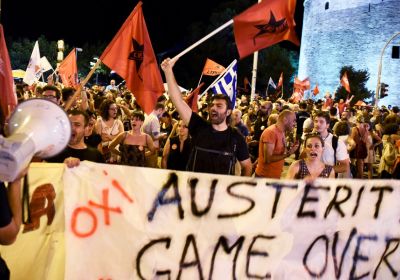
The Greek parliament passed a second bill on July 23 including measures needed for Greece to open negotiations over the eurozone's bailout package of 86 billion euros, TeleSUR English said that day.
-
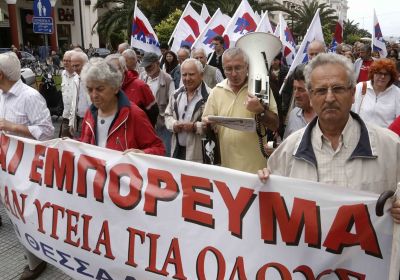
Greece's austerity-and-debt-driven crisis has prompted a humanitarian catastrophe. The Australia-Greece Solidarity Campaign says half of all young people cannot find work, there is a growing shortage of essential medicines and child malnutrition rates have reached levels not seen since World War II.
-
Members of the European Parliament show support for Greece against its creditors. "This debate is not exclusively about one country," said the Greece's left-wing Prime Minister Alexis Tsipras in a speech to the European Parliament on July 8. "It is about the future of our common construction."
-
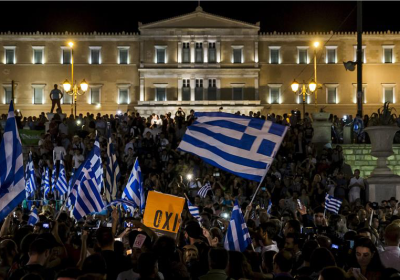
After Greece voted "no" by a large margin to more brutal austerity, Solidarity4All issued a call for assistance and solidarity on July 7, published below.
-
 Supports of the 'no' vote celebrate in Athens on the night of July 5.
Leaders of Latin American left-wing governments have congratulated the Greek government and its people after Greece's historic July 5 referendum. Voters rejected debt austerity proposals by Greece's European lenders.
Venezuelan President Nicolas Maduro said: “The ‘no’ vote in Greece is a victory against the financial terrorism carried out by the International Monetary Fund (IMF).”
Supports of the 'no' vote celebrate in Athens on the night of July 5.
Leaders of Latin American left-wing governments have congratulated the Greek government and its people after Greece's historic July 5 referendum. Voters rejected debt austerity proposals by Greece's European lenders.
Venezuelan President Nicolas Maduro said: “The ‘no’ vote in Greece is a victory against the financial terrorism carried out by the International Monetary Fund (IMF).”
-
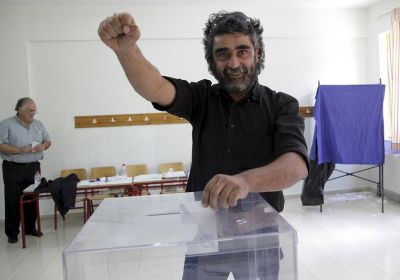
Streets in cities across Greece has erupted into celebrations as results from Sunday’s referendum showed voters clearly rejecting the bailout terms put forward by the country’s lenders.
-
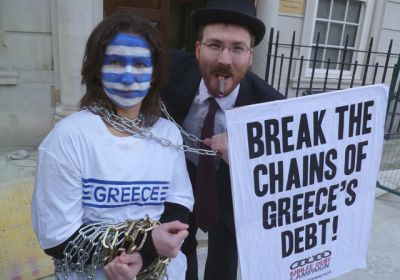
The Jubilee Debt Campaign (JDC) released figures in April showing the International Monetary Fund had made €2.5 billion of profit out of its loans to Greece since 2010.